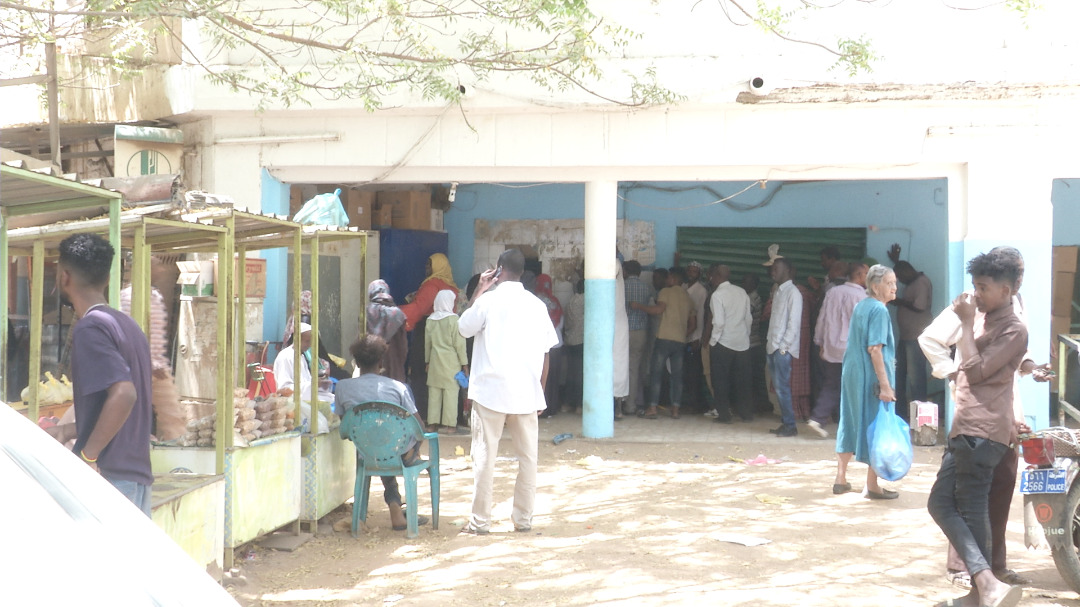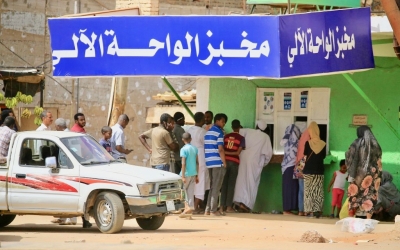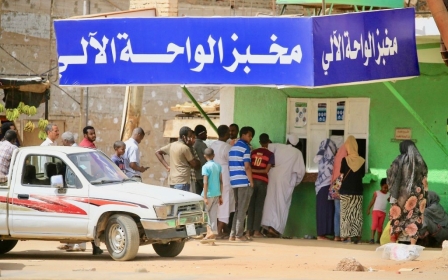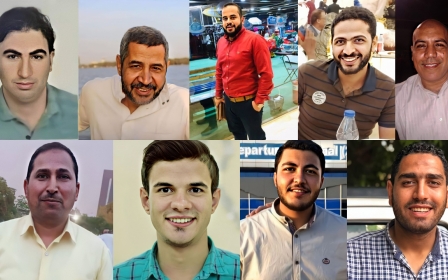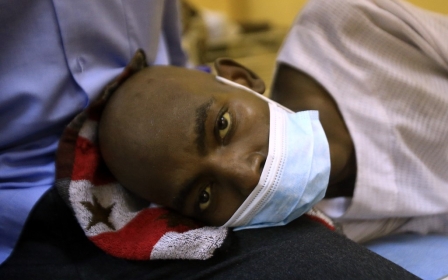Coronavirus: Sudanese decry long queues for food, fuel and cash amid pandemic
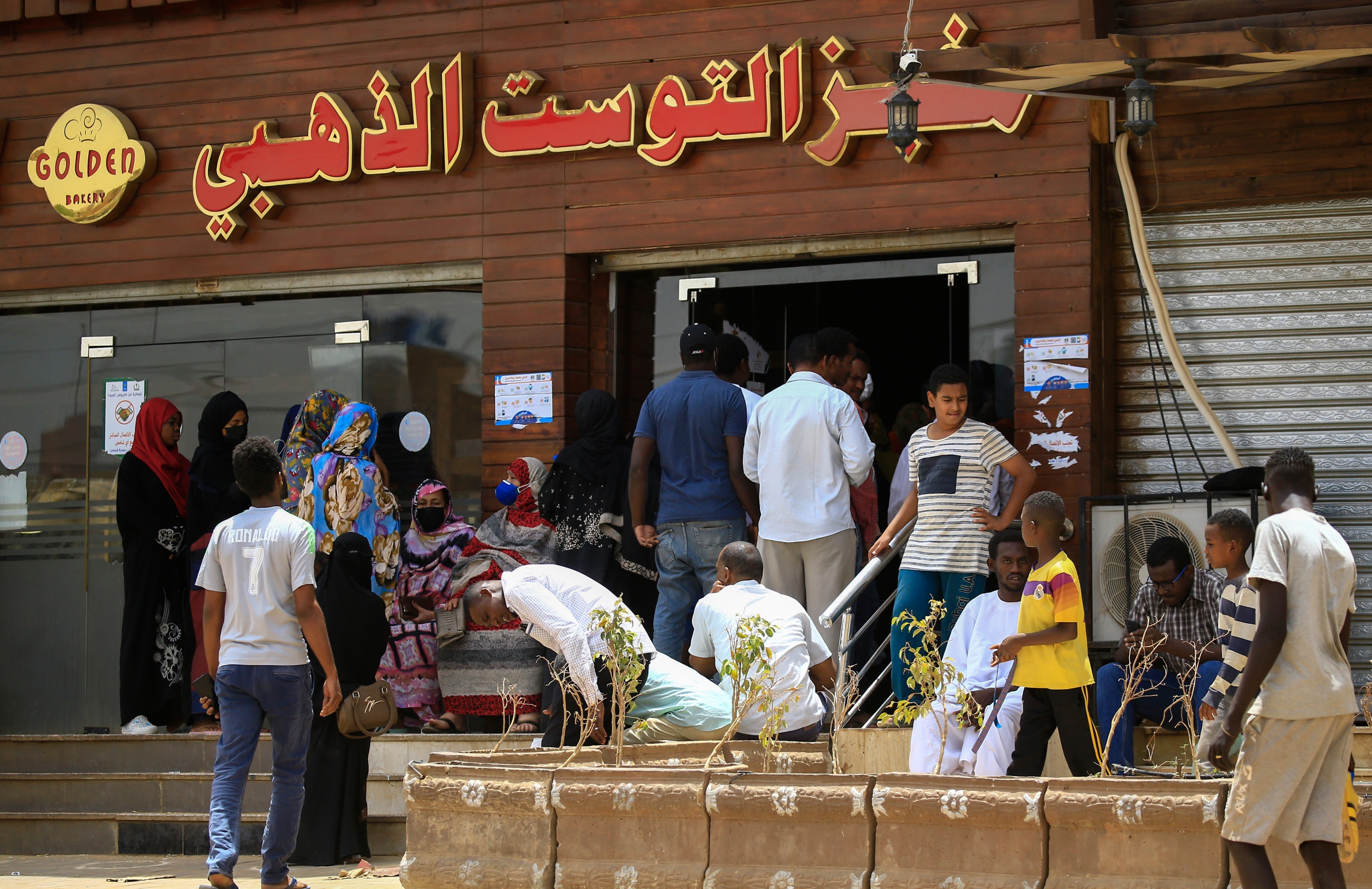
The arrival of the coronavirus pandemic in Sudan has exacerbated an already critical situation for the country's economy and healthcare system, while the economic hardship faced by many ordinary Sudanese have made the imposition of a lockdown difficult.
Despite attempts by the government to get people to remain indoors and practice social distancing, queues for bread and other essentials are commonplace in Sudan.
In front of the Rose bakery in the Riyadh neighbourhood of Khartoum, dozens of people stood under the hot sun waiting for their quota of bread with scant regard for the two-metre distance between people recommended by health experts to limit the spread of the virus.
Bilal Osman, 45, told Middle East Eye that the bread crisis in Sudan was serious and that price hikes had made life unbearable.
He said he had taken part in anti-government demonstrations that toppled the administration of longtime ruler Omar al-Bashir in 2019, but that subsequent instability meant making adjustments for the coronavirus pandemic was out of the question.
New MEE newsletter: Jerusalem Dispatch
Sign up to get the latest insights and analysis on Israel-Palestine, alongside Turkey Unpacked and other MEE newsletters
"The government is asking people to avoid gatherings to stop spreading coronavirus - but people need to stand for bread and food,” he complained.
Areej Ahmed, 30, sat in her car in the queue near the Nile petrol station on Obaid Khatim Street in Khartoum as she told MEE she had been waiting for nearly five hours to get fuel.
“You see people spending their whole day in front of this petrol station," she explained.
"The problem is bigger than that. This fuel crisis is not just obstructing efforts to fight the coronavirus, but also badly affecting public transportation as well as the entire agricultural and industrial sectors."
The Sudanese government has attempted to control the flow of bread and fuel through negotiation with friendly countries, strengthening its monitoring system to prevent the growth of a black market and the smuggling of goods abroad.
'How come the government want us to 'stay at home' while there is no power and water - the weather is too hot and we need to clean ourselves and wash our hands'
- Mahmoud Abu Talib, Omdurman resident
But despite record-low oil prices, queues for food, ATMs and fuel have remained. With 19 confirmed cases of coronavirus, including two deaths, in the country as of 13 April, the pandemic has only compounded a difficult situation.
Mahmoud Abu Talib, 32, a resident of Omdurman, Khartoum's twin city, complained that continuous electricity and water cuts were preventing social distancing and the other precautions against the coronavirus.
“How come the government want us to 'stay at home' while there is no power and water - the weather is too hot and we need to clean ourselves and wash our hands," he said.
"We have children and elderly people - how they can bear this?"
Tackling a crisis
Since Bashir's overthrow in April 2019, Sudan has witnessed an escalating humanitarian crisis, including a lack of food, fuel and power as well as soaring prices and unprecedented inflation exceeding 70 percent last year.
The UN said in its latest humanitarian bulletin in April that more than nine million people were food insecure in Sudan, adding that the price of food and essential commodities had risen since February.
However, the head of strategic commodities in the Ministry of Finance, Ali Khalifa Askouri, told MEE that food security in Sudan was better than reported.
“Despite the coronavirus situation, we are satisfied about food security as the current season of wheat cultivation is very successful and we expect that we will produce around one million tons of wheat.
"We only have a logistical problem regarding fuel, transportation and distribution and that will be solved in the coming few days,” he explained.
“We have also another agreement with the World Food Programme and that would provide enough wheat to cover consumption for another two months - so the situation is comfortable and furthermore we can say that we can cover our needs through our domestic resources at this difficult moment for the entire globe,” he added.
Earlier this month, Sudanese Prime Minister Abdalla Hamdok launched a donation campaign in order to help fight coronavirus as well as improve the economy.
He received a wide response as millions donated within a few days.
'The queues for fuel wouldn’t play a negative role in spreading the virus if the people committed to sit inside their cars while they are queuing'
- Hamdi Suleman Hamid, Energy Ministry
The government committee tasked with fighting the virus said it would provide paid holiday to employees who were pregnant or rearing small children, as well as to those above 55 years old in both the private and public sectors.
Pro-democracy protesters have also organised broad campaigns to collect and distribute food for poor families in Khartoum, as well as donate surgical masks and other services.
Ministry of Trade and Industry Undersecretary Mohamed Ali Abdullah told MEE that his ministry was carrying out a survey with importers and the Chamber of Commerce to report on the situation of its strategic commodity reserves.
“As a precautionary measure during these exceptional circumstances, we ordered the private sector, the union of businessmen, Chamber of Commerce, and all importers of commodities to report about the detailed situation of strategic reserves of goods within seven hours,” Abdullah said.
He warned that anyone who violated government measures to monitor the availability and cost of commodities would be punished.
The Ministry of Energy and Mining also announced that a new electricity deal with Egypt had been concluded and would begin its operations to produce 60 megawatts of power.
It confirmed in a statement last week that the new line of power from Egypt would fill the electricity gap in the northern states that border Egypt.
The ministry also disclosed a plan to buy and store big reserves of fuel in this period, taking advantage of the decline in international oil prices.
“I would like to stress here that we are working to overcome this crisis for good," Energy Ministry Undersecretary Hamdi Suleiman Hamid told MEE over the phone.
"But the queues for fuel wouldn’t play a negative role in spreading the virus if the people committed to sit inside their cars while they are queuing."
This article is available in French on Middle East Eye French edition.
Middle East Eye delivers independent and unrivalled coverage and analysis of the Middle East, North Africa and beyond. To learn more about republishing this content and the associated fees, please fill out this form. More about MEE can be found here.


